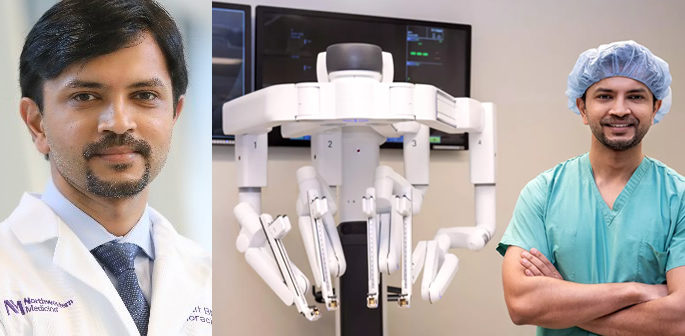“This could serve as a lifesaving intervention.”
An Indian-origin doctor and his team of surgeons performed a double lung transplant on a former Covid-19 patient. It is a surgery that is believed to be the first of its kind in the United States since the pandemic began.
Northwestern Medicine in Chicago said the patient, a woman in her 20s would not have survived without the transplant.
She is currently recovering from the operation and from two previous months on lung and heart assistance devices.
Ankit Bharat said organ transplantation may become more frequent for victims of the most severe forms of Covid-19.
Dr Bharat said: “I certainly expect some of these patients will have such severe lung injury that they will not be able to carry on without transplant.
“This could serve as a lifesaving intervention.”
While the first known lung transplant to treat a Covid-19 patient happened in Austria, Dr Bharat said he is not aware of another organ transplant of any kind in the United States involving a patient who had contracted Covid-19.
Dr Bharat’s patient had been on immunosuppressant medication for a previous condition when she contracted Coronavirus.
According to Dr Bharat, that may have been the reason for the virus having such an effect on her lungs.
The patient developed secondary bacterial infections that could be controlled by antibiotics because her lungs were so badly damaged.
Dr Bharat said: “They develop these strange holes in the lungs. If you were to cut the lung, it kind of resembles a Swiss cheese.”
As the woman’s lungs worsened, her heart also began to fail, followed by other organs that were not receiving enough oxygen.
She was placed on a mechanical ventilator to help her breathe and later an extracorporeal membrane oxygenation device, which adds oxygen to blood outside the body and helps the heart pump blood through vessels.
Doctors repeatedly tested fluid from her lungs to ensure she was negative before operating, however, by that time, she was even sicker.
Dr Bharat admitted:
“This is one of the toughest transplants I’ve done. This was truly one of the most challenging cases.”
The woman spent two days on the waiting list before an appropriate lung donor was found.
Initially, the woman’s physicians were unsure that the lungs would qualify but the Northwestern program was able to work with the donor’s lungs to make them suitable.
Following the 10-hour operation, the woman is now breathing through a tube inserted in her trachea. She is awake, eating and communicating with family through a phone.
Dr Bharat said her other organs have recovered and her long-term prognosis is good but she faces a long rehabilitation.
The average life of a double lung transplant is approximately nine years before they have to be replaced, but experts have seen transplanted lungs function much longer.
Dr Bharat said the patient is covered by private insurance for most of her transplant and hospitalisation costs.






























































